Super User
Saica paper expands the nature kraft range of basis weights
Saica Group improves its offer of 100% recycled and sustainable papers.
- Nature Kraft, is a 100% recycled paper that is an alternative to traditional kraftliners due to its high physical-mechanical performance and similar appearance to virgin fibre.
- The new basis weights satisfy the increasing demand for sustainable packaging, with high print quality, whilst also promoting the circular economy.
Saica Paper, the Saica Group business division that produces recycled paper for corrugated, expands the basis weights of Nature Kraft from 115 g/m2 to 245 g/m2. Nature Kraft, a 100% recycled paper is an alternative to traditional kraftliners due to its high physical-mechanical performance and similar appearance to virgin fibre. With this product development Saica signals its commitment to sustainable and innovative solutions, that respond to the increasing demand for environmentally friendly products which, at the same time, provide high print quality.
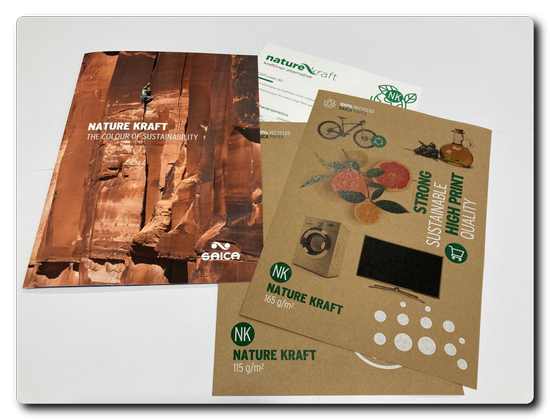
The extension of basis weights is the result of innovative technology, designed specifically to engineer new solutions in a market in constant change, whilst also offering a solution to the needs of high-quality sustainable packaging that will help progress in the aims of the circular economy.
These papers respond to the environmental requirements of final customers-brands, helping reinforce their image while moving towards environmentally friendly and sustainable goals. The Nature Kraft range is characterised by:
- Ease of use in corrugating and exceptional performance
- Suitable for dry food contact
- FSC® certified
- Optimal print quality, allowing a wide range of finishing and packaging customisation.
The new higher basis weights are suitable for more demanding applications, such as the agriculture sector. The new lower basis weight, 115g/m2, is designed to be broadly used in the food and retail sectors and allows a higher optimisation of resources by substantially reducing the weight of packaging whilst providing equivalent, or better, performance than papers of higher basis weights.
The new Czech owner of Slovenian paper mill Vipap bets on flexibility and a more diverse portfolio.
More than a quarter of a billion CZK will be invested in expanding the production of food packaging
- Restructuring of Slovenian paper mill Vipap Videm Krško under the leadership of the new Czech owner RIDG Holding continues, despite the coronavirus circumstances.
- A greater production flexibility and a wider range of products should help to make the company more competitive. It will be achieved by a quarter-billion investment in modern technologies for the production of food packaging. On the contrary, the share of newsprint is to fall.
- The improving prospects of the company are supported by the expected end of sharp fluctuations in the recycled paper market, which is Vipap Videm Krško paper mill's main input raw material.
While until now newsprint and magazine paper accounted for 90% of the production of Slovenian paper mill Vipap Videm Krško, its share will fall by half within three years. As a part of the already started restructuring, the new Czech owner RIDG Holding wants to reorient the company more towards the production of food packaging paper. It invests more than a quarter of a billion Czech crowns in the modern technologies that will enable it.
Vipap also goes the way of greater specialization and flexibility. Unlike the competition will be able to meet clients´ specific demands better. "The correctness of the new strategy with a greater emphasis on food packaging paper was confirmed during the coronavirus crisis, when this segment maintained stable market demand," describes Petr Domin, CEO and Chairman of the Board of Vipap Videm Krško.
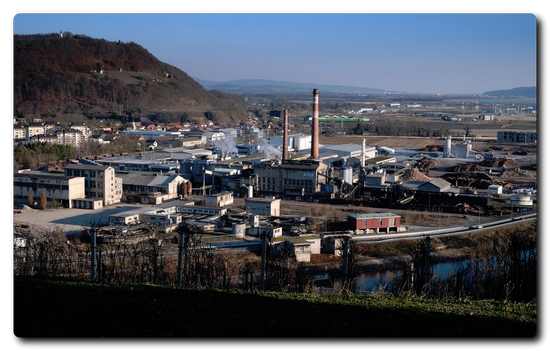
RIDG Holding took over Slovenian paper mill last year and the company under its leadership ended the calendar year with a significantly positive operating profit EBITDA of € 7 million and a positive cash flow. The new owner, in addition to redesigning the company's processes, also immediately started investing in technology modernization and employees development, in order to make the company more flexible. “We see the acquisition of Vipap Videm Krško paper mill as a strategic and long-term matter. That´s why we´ve decided to make structural changes and invest in modern technologies, that will help the company respond better to market development and provide it enough opportunities for sustainable growth,” says Pavel Svoreň, Executive Director of the Portiva Investment Group, which together with the IPIDC Group, the Investment Club and the KRPA Holding Group forms a consortium of RIDG Holding.
One of the key innovations in Vipap paper mill is the expansion of the product range. In addition to newsprint, magazines and advertising leaflets, currently also paper bags, carrier bags and laminated paper is being added. This segment of production is on the rise due to the fact that a number of European countries have decided to replace the plastic packaging with paper. In addition, new technologies will make it possible to bring to the market the food packaging, that is durable and at the same time fully recyclable.
In addition to the expanding product portfolio, the Slovenian government's support programs also helped Vipap Videm Krško to maintain employment during the coronavirus crisis. Like many other countries, including the Czech Republic, it has introduced the so-called kurzarbeit. The extraordinary commitment of employees also played an important role. "Probably as the only newsprint mill in Europe, we have kept production uninterrupted and helped our customers maintain production in difficult times," says Domin.
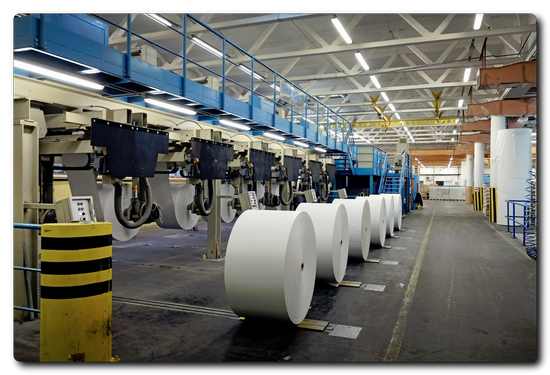
According to him, the company also takes advantage of the opportunity to accelerate structural changes, to speed up the setting up of new processes and even more intensively focuses on a team building and the development of key employees. All this despite the fact, that the shortage of recycled paper, which is one of the main raw materials for production, has gradually started in Europe. "What´s not produced and not sold cannot be later collected and recycled. From one extreme, when during January and February it was not even worthy for collectors to carry paper to buyers due to its low price, the market shifted to the opposite situation due to fears of coronavirus infection, where the price rose sharply and recycled paper was temporarily unavailable," describes Domin, according to which the market situation has already improved and the prices and availability of recycled paper are gradually stabilizing. The director of the paper mill expresses a slight optimism about the future development and reckons, that the next four weeks should show the real condition of the market.
Management of Vipap Videm Krško now estimates that in the event of a favorable development, the company could return to pre-crisis level at the end of this year. Completion of the restructuring, which is to direct the paper mill towards long-term competitiveness and growth, is planned for the turn of 2021 and 2022.
Södra posts a stable result but the outlook remains unclear
Södra’s operating profit during Q2 was stable given current market conditions. Deliveries were higher year-on-year, but prices for Södra’s core products were considerably weaker than in 2019. For the first half of 2020, operating profit totalled SEK 449 million (2,009), return on capital employed was 4 per cent (19) and the equity ratio was 57 per cent. Sales for the second quarter amounted to SEK 5,416 million (6,199) and operating profit totalled SEK 221 million (861).
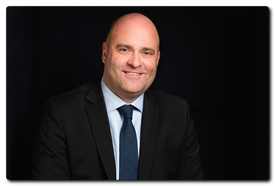 Peter Karlsson, Interim President and CEO“The global outbreak of COVID-19 has led to a serious global crisis. The extent of the economic impact is uncertain, since both production and demand have declined globally. It is with great respect and gratitude that I see how we are continuing to work together to slow the spread of the virus, while simultaneously managing our day-to-day operations,” said Peter Karlsson, Interim President and CEO. “We are also looking ahead and the Board has decided to make additional investments as part of the plan to increase the annual production capacity of our pulp mill at Värö to 850,000 tonnes so that Södra can continue to grow profitability as we move forward.
Peter Karlsson, Interim President and CEO“The global outbreak of COVID-19 has led to a serious global crisis. The extent of the economic impact is uncertain, since both production and demand have declined globally. It is with great respect and gratitude that I see how we are continuing to work together to slow the spread of the virus, while simultaneously managing our day-to-day operations,” said Peter Karlsson, Interim President and CEO. “We are also looking ahead and the Board has decided to make additional investments as part of the plan to increase the annual production capacity of our pulp mill at Värö to 850,000 tonnes so that Södra can continue to grow profitability as we move forward.
“Given the current market conditions, Södra posted a stable result in line with expectations for the first half of the year,” Karlsson added. “Net sales amounted to SEK 10,993 million (12,517) and operating profit totalled SEK 449 million (2,009). Demand for Södra’s core products was favourable, although prices for paper pulp and sawn timber were considerably lower year-on-year, albeit slightly higher at the end of the six-month period than at the beginning of the year.
“The management of storm-damaged and spruce-bark-beetle infested forests has been a priority, but there will still be challenges to deal with in the coming quarters,” Karlsson continued.
“A key element of Södra’s strategy for sustainable and profitable growth is the efficient use of wood raw material. One example is the pilot facility that is now under construction in Tofte, Norway. The facility aims to develop both the process and the technology for liquid biofuel,” Karlsson added. “A full-scale facility for liquid biofuel production has then been planned. With this initiative, we are taking further steps towards a fossil-free future by processing forest products. At the same time, it is also important that politicians facilitate the use of the potential of forests in the transition to a sustainable bioeconomy.”
In the second quarter of 2020, Södra’s consolidated net sales declined 13 per cent to SEK 5,416 million (6,199) and operating profit totalled SEK 221 million (861). The lower profitability was due to lower price levels for paper pulp and sawn timber compared with the year-earlier period. The operating margin was 4 per cent (14). During the first six months, sales declined 12 per cent to SEK 10,993 million (12,517) and operating profit totalled SEK 449 million (2,009). The operating margin was 4 per cent (16). Return on capital employed was 4 per cent (19) and the equity ratio was 57 per cent.
Södra Skog’s operating profit for the period totalled SEK 51 million (79). The result was due to weaker margins. During the same period, Södra Skog acquired 4.3 million m³sub, comprising 59 per cent pulpwood and cellulose chips, 31 per cent saw logs and 10 per cent biofuels.
Södra Wood’s operating profit for the period totalled SEK 62 million (118) and reflects the lower price trend for sawn timber. Underlying demand for sawn timber remained favourable. Deliveries from Södra Wood rose to 569,000 m³ sawn wood compared with 542,000 m³ sawn wood in the year-earlier period. Sales for the quarter amounted to SEK 1,580 million (1,592).
Södra Cell’s operating profit for the period totalled SEK 250 million (753). The earnings decline was attributable to considerably lower prices. Sales for the quarter amounted to SEK 2,626 million (3,250). Production totalled 483,000 tonnes, comprising 412,000 tonnes of NBSK, 33,000 tonnes of NBHK and 38,000 tonnes of dissolving pulp.
Cepi launches an LCA tool for paper products
In December 2019, the European Commission presented its ambitious Green Deal roadmap, a comprehensive strategy aimed at putting Europe on the right track for climate neutrality in 2050 while encouraging sustainable economic growth.
In this strategy, the role of consumers is clearly recognized: this transition won’t happen without them. However, green washing is a threat to their involvement: they won’t be able to make more sustainable choices if they don’t receive reliable, comparable and verifiable information.
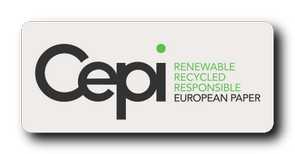 For that reason, the European Commission has decided to leverage the Product Environmental Footprint (PEF) method to distinguish between valid green claims and green washing.
For that reason, the European Commission has decided to leverage the Product Environmental Footprint (PEF) method to distinguish between valid green claims and green washing.
We are proud to announce today that Cepi together with its member companies has developed an LCA tool fully based on the Intermediate Paper Product PEF Category Rules (PEFCR).
The PEF tool enables any Cepi member company to calculate product LCAs and validate their green claims within the Green Deal context. The tool has been designed for both LCA experts as well as users less familiar with the LCA methodologies. Having access to an LCA tool makes it significantly easier for small and medium size enterprises to compute complex Product Environmental Footprints for their products.
The foundations of the PEF work were established in 2013, the idea was to develop a harmonized method to evaluate the environmental friendliness of products, focusing on their carbon footprint and related GHG emissions.
The initiative gave way to two projects: Product Environmental Footprint (PEF) and Organisation Environmental Footprint (OEF) with the objective of developing a harmonized environmental footprinting methodology that can accommodate a broader suite of relevant environmental performance criteria.
The European Paper Industry participated to the EU PEF Pilot project in 2011 and again in 2013-2018: we were one of the 15 sectors that delivered PEF Category Rules. The Intermediate Paper Product PEFCR is the most complete of any EU PEF Pilot Category Rules allowing in-depth primary production data be used for the results and enabling understanding of improvements in time as well as improvement areas. The Intermediate Paper Product PEFCR is a detailed LCA calculation method for paper that will be converted into finalised products such as packaging, print and tissue.
The tool that Cepi is launching today has been developed in collaboration with Green Delta, the partner with whom the Intermediate Paper Product PEFCR Development Group tested the remodeling of the Category Rules. The tool strictly follows the PEFCR and uses the secondary datasets dedicated for PEF while being the only available tool to deliver EU PEFCR compliant results. The tool has been developed to be of use for small and mid-size enterprises in mind and is available to all Cepi members free of charge.
There are still areas of improvement for both the industry and the PEF methodology. These include:
- Improved and up-to-date datasets for all paper products
- Further development of the land use impact methodology that reflects sustainable forest management realistically
- Further develop the circularity formula
- Developing rules on how intermediate product footprint results will be linked to the final product calculations.
The EU PEF Project continues in 2021 with lessons learned from the 2018-2020 transition period. Cepi together with its sister associations is committed to work further with the EU institutions on the development of the PEF and OEF.
All wrapped up! James cropper launches 100% recycled paper collection for premium packaging
For more and more brands, being able to demonstrate the social and environmental impact of their products is becoming a pre-requisite. With this in mind, specialist papermaker James Cropper has launched a new collection of papers for premium packaging, including an option with the ultimate 100% post-consumer waste recycled fibre.
The Rydal Packaging Collection, whose name is inspired by a small village and water in the Lake District, best known as the home of the poet William Wordsworth, addresses the need for sustainable papers for retail packaging that do not compromise quality or beauty. As well as offering 100% post-consumer waste recycled, the range also includes options for 40% post-consumer waste recycled and 100% fresh fibre from responsible forestry sources.
The recycled qualities in the collection include James Cropper’s innovative CupCycling™ fibre, sourced from used coffee cups. With 175 years of papermaking heritage, James Cropper created the world’s first technology to upcycle used coffee cups. This unique post-consumer fibre stream gives a second life to a valuable resource and is designed with circular economy principles at the core.
Tricia Hartmann, packaging lead at James Cropper comments, “While beauty and functionality have always been expected of luxury products, today’s consumers also insist they are environmentally and socially responsible.
“Those same high standards applied to the product itself, now also extend to the entire supply chain, including the packaging. The Rydal Packaging Collection was created to directly answer this need while safeguarding the beauty of premium paper and ensuring a variety of application possibilities for brands.”
Engineered to provide a natural and tactile feel, the new collection is suitable for folding boxes, shopping bags and box covering applications and ensures outstanding print performance and converting characteristics.
Currently available for production and to order in large format sheets for sample dummies and print tests, the collection includes three shades of white and three shades of black. There is also an option for bespoke colours and textural finishes as part of James Cropper’s Tailor Made service.
For those brands wanting the added assurance of antimicrobial product protection, James Cropper’s innovative PaperGard silver ion technology can be included for all Rydal packaging options.
Christoph Michalski appointed new CEO of BillerudKorsnäs
The Board of Directors has appointed Christoph Michalski as new President and CEO of the company. He succeeds Lennart Holm, who has been acting President and CEO since November 2019. Christoph Michalski will assume his new position November 1 2020.
 Christoph Michalski is since 2015 the CEO and Executive Director of Vinda International Holding Ltd, a leading Asian producer of high quality and innovative tissue- and hygiene products publicly listed on the Hongkong stock exchange. Before that, he has held various senior executive positions within the SCA group and he also has experience from the FMCG sector working for Unilever and Fonterra. Christoph Michalski is a German national with a Master in Economics from the Christian Albrechts University of Kiel in Germany.
Christoph Michalski is since 2015 the CEO and Executive Director of Vinda International Holding Ltd, a leading Asian producer of high quality and innovative tissue- and hygiene products publicly listed on the Hongkong stock exchange. Before that, he has held various senior executive positions within the SCA group and he also has experience from the FMCG sector working for Unilever and Fonterra. Christoph Michalski is a German national with a Master in Economics from the Christian Albrechts University of Kiel in Germany.
“It is with great pleasure we can present Christoph Michalski as the new President and CEO of BillerudKorsnäs”, says Jan Åström, Chairman of the Board. “Christoph is a strong leader and experienced CEO from the forest products industry, with a track record of leading transformational journeys towards customer and innovation focus in a global context. His international experience is hard to match, and with his proven ability to create shareholder value through profitable growth, I am convinced that Christoph is a leader that can continue and accelerate the strategic journey of BillerudKorsnäs to secure long-term value creation”, Jan Åström continues. “I also want to take this opportunity to thank Lennart Holm for a very well-executed assignment as acting CEO”, Jan Åström concludes.
“I am very excited about joining BillerudKorsnäs”, says Christoph Michalski. “I see enormous potential in the company. The world is undergoing a transformational shift towards environmentally sustainable packaging and e-commerce, and BillerudKorsnäs has just the right position to capture the values in that shift. I look forward to taking on the challenge of developing BillerudKorsnäs into its full potential”, Christoph Michalski continues.Lennart Holm, acting President and CEO of BillerudKorsnäs, leaves his position when Christoph Michalski assumes his new role, but will remain with the company as an advisor until the end of 2020.
Two Sides North America Launches "Love Paper" Campaign
Website and ads feature sustainability facts about print and paper products related to forestry, recycling and renewable energy use in the U.S. and Canada
Two Sides North America has just announced the launch of Love Paper, a new campaign designed to raise consumer awareness of the unique and inherently sustainable characteristics of print, paper and paper-based packaging. The centerpiece of the campaign is a consumer-friendly website, lovepaperna.org, where the click of a mouse reveals surprising facts about how print and paper products contribute to a sustainable future for us all.
“As consumers become increasingly concerned about the environmental impacts of the publications they read, the products they buy and the packaging those products come in, they need factual, science-based information to make informed purchasing decisions,” says Two Sides North America President Phil Riebel. “But all too often, they have little more than unsubstantiated marketing claims like ‘go green, go paperless’ or ‘going paperless saves trees’ to guide them. We created the Love Paper campaign to make it easy for anyone to get verifiable facts about the sustainability of print and paper products from a wide variety of trusted sources.”
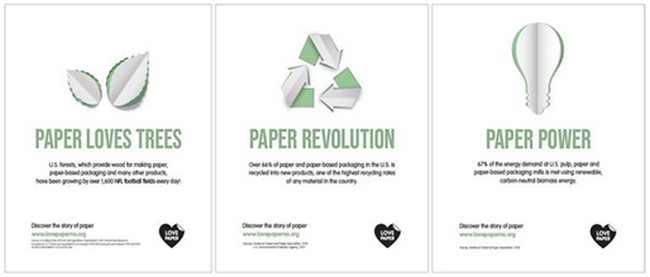
Publisher support
A key element of the Love Paper campaign is a series of print ads that promote the sustainability of print and paper. The ads, which focus on the sustainable forestry, recycling and renewable energy advantages of paper, are available to newspaper and magazine publishers free of charge. Editor & Publisher (E&P) magazine, the authoritative journal covering all aspects of the newspaper industry, is among the ad campaign’s most enthusiastic supporters.
“The newspaper industry and our suppliers are very focused on environmental sustainability, so supporting the Love Paper campaign is a natural fit for us,” says E&P Publisher Mike Blinder. “We especially like the ‘Paper Revolution’ ad on recycling because newspaper recycling is such a big part of the American recycling success story. Nearly 70% of old newspapers are recycled into new newsprint, boxboard and other products. The Love Paper ads help us share this great story with our readers.”
The full color ads are available in full page, half page (horizontal and vertical) and quarter page sizes. Publishers interested in running the ads can go to the “For Publishers” page on the www.lovepaperna.org website or email Two Sides North America at This email address is being protected from spambots. You need JavaScript enabled to view it..
Consumers Underestimate the Sustainability of Print and Paper Products
By their very nature, print and paper products are an important part of a circular economy where resources are used as productively and efficiently as possible. They are made with renewable raw materials, are recyclable and in North America are manufactured using mostly renewable, carbon-neutral energy, making them an environmentally sound choice for reading materials, communications and packaging solutions. Yet many North American consumers significantly underestimate how sustainable print and paper products truly are.
For example, a 2019 survey commissioned by Two Sides found that 58% of consumers believe U.S. forests are shrinking. In fact, the U.N. Food and Agriculture Organization estimates these forests, which supply the fresh wood fiber used by the U.S. pulp and paper industry, grew by a net area equivalent to more than 1,600 NFL football fields per day between 1990 and 2015. In Canada, only 21% of consumers think the recycling rate for paper and paper-based packaging exceeds 60%. In reality, the Canadian recycling rate is among the highest in the world at 70% according to the Forest Products Association of Canada.
“Our surveys also show that 68% of U.S. consumers believe print is the most enjoyable way to read books and 65% prefer reading printed magazines, with Canadian consumer preferences closely matching those of Americans,” Riebel says. “On the packaging side, our data also show that more than half of U.S. consumers surveyed are actively taking steps to reduce their use of plastic packaging as evidence of harm caused by plastic litter in the oceans continues to grow. The Love Paper campaign provides credible, fact-based information on why print and paper products are an environmentally responsible choice.”
About Two Sides
Two Sides North America, Inc. is an independent, non-profit organization that promotes the sustainability of the Graphic Communications and Paper-based Packaging value chain and dispels common environmental misperceptions about print and paper products. We are part of the Two Sides global network which includes more than 600 member companies across North America, South America, Europe, Australia and South Africa. Our member companies span the Graphic Communications and Paper-based Packaging value chain, including forestry, pulp, paper, paper-based packaging, chemicals and inks, pre-press, press, finishing, printing, publishing, envelopes and postal operations. For more information about Two Sides North America, visit us at www.twosidesna.org
New Hägglunds Service Website From Bosch Rexroth Provides Easy Access for Certified Repair Work
Online service portal helps users with factory-authorized maintenance and repair for Hägglunds hydraulic direct drive systems and motors, including legacy Marathon motors.
Bosch Rexroth has introduced a new online service portal for its Hägglunds hydraulic motors, giving users a single source of information to maintain, repair, modernize or upgrade their equipment with certified specialists and genuine Hägglunds parts. The service portal is accessible from www.boschrexroth-us.com/Hagglunds
With more than 60,000 motors installed globally, Hägglunds low-speed high-torque radial piston drive systems are used in a wide range of industries – from mining and pulp and paper production to recycling systems, marine applications and more.
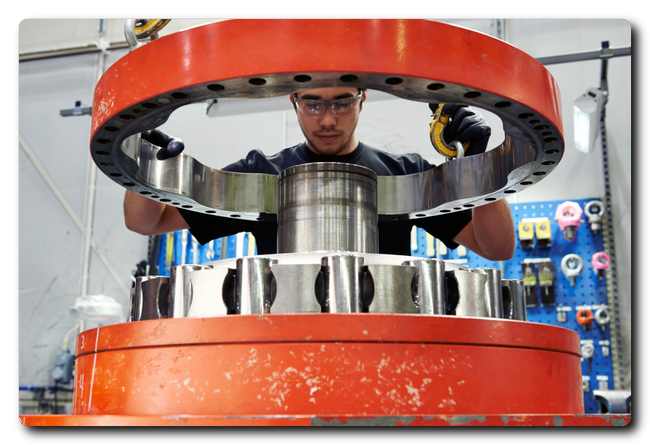 The new Hägglunds Service Center website from Bosch Rexroth provides information to help users with servicing, repairing, modernizing or upgrading Hägglunds drive systems
The new Hägglunds Service Center website from Bosch Rexroth provides information to help users with servicing, repairing, modernizing or upgrading Hägglunds drive systems
“We developed this website to help customers maintain the highest productivity and reliability for their Hägglunds motors, whether they need original, warrantied spare parts or guidance from a certified specialist,” said Brian Howell, Hägglunds Sales and Operations Manager. “No one knows a Hägglunds motor or drive system better than the original equipment provider, and that’s us. When users choose authorized Hägglunds service from Bosch Rexroth, our certified technicians bring their drives and systems back to new performance levels, along with a full factory warranty.
“We know customers rely on Hägglunds motors and drives to last a long time, and we can help them accurately assess the condition and advise the repair necessary to continue a long-life and maintain uptime.”
The website makes it easy for Hägglunds customers to request a motor return via a simple form submission. They can also learn about upgrading motors and drive units with information on motor comparisons, upgrade kits, cooling improvements for drive units and scalable options to fit their needs. In addition, users can access repair and maintenance resources for legacy Hägglunds Marathon motors, which are no longer in production. In addition, the website provides information about:
- Direct support from certified Hägglunds technical experts for complete system component inspection and analysis
- On-site examinations by certified service specialists equipped for inspection, repair and preventive maintenance support
- Hägglunds-authorized repairs, carried out by skilled, factory-certified personnel at the customer location or at a Rexroth U.S. Hägglunds facility in Ohio or Texas
- Preventive maintenance program offering a full range of services, including written inspection reports, oil level and pressure checks and electrical element inspections
- Genuine Hägglunds spare parts, backed by extended warranty options and fast shipping from strategically located inventories
- Hands-on, in-depth training covering the major hydraulics, electronics and controls of Hӓgglunds large hydraulic drives; training is provided by factory-certified trainers and can be conducted at a customer location or at a Rexroth training facility
The online service center is the latest addition to the Bosch Rexroth portfolio of informative, free resources. The company also offers a free Hägglunds Resource Kit with information ranging from detailed customer case studies to online engineering tools.
Visit www.boschrexroth-us.com/Hagglunds for more information.
ANDRITZ to supply pulp production technologies and key process equipment for Sun Paper’s new mill in Beihai, China
International technology group ANDRITZ has received an order from Sun Paper to supply pulp dewatering and white liquor plant technologies and key process equipment for their new pulp mill in Beihai, China.
Start-up is scheduled for the fourth quarter of 2021.
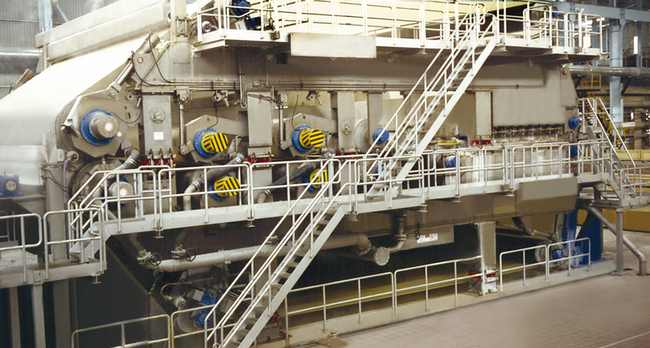 ANDRITZ Twin Wire Press for pulp dewatering © ANDRITZ
ANDRITZ Twin Wire Press for pulp dewatering © ANDRITZ
The scope of supply on EPS basis includes the following equipment:
- Wet lap system with two production lines for a capacity of 1,120 admt/d bleached hardwood kraft pulp, each consisting of a Twin Wire Press for pulp dewatering, a cutter-layboy and a baling line.
The proven ANDRITZ wet lap technology ensures high operational availability and higher final dryness than other wet lap systems in the market. Wet lap is flexible with regard to the pulp type, with the option of producing also other pulp grades if needed. The wet lap system supplied by ANDRITZ will have the highest capacity ever installed in China.
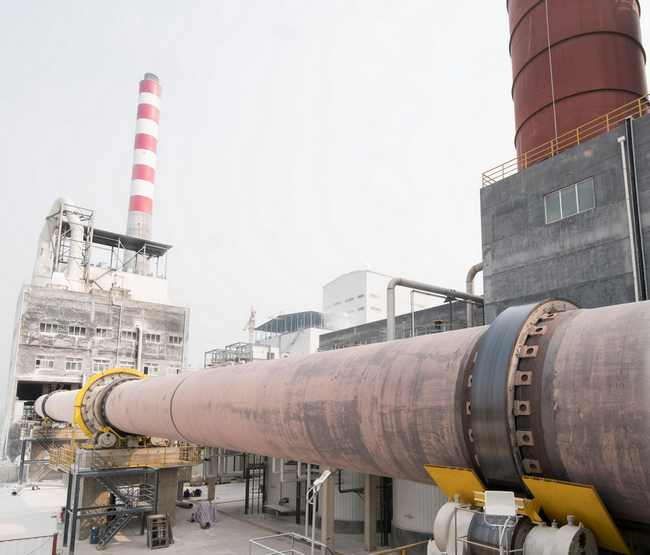 ANDRITZ LimeKiln started up in 2015 at Shandong Sun Honghe mill in Zhoucheng, China. © ANDRITZ
ANDRITZ LimeKiln started up in 2015 at Shandong Sun Honghe mill in Zhoucheng, China. © ANDRITZ
- White liquor plant with a capacity of 10,500 m3/d and comprising major recausticizing equipment and an ANDRITZ LimeKiln. The recausticizing plant delivery includes a LimeSlake slaker-classifier, three causticizing tank agitators, white liquor filtration with a LimeWhite filter to maximize the white liquor quality, and efficient lime mud filtration with a LimeDry filter ensuring high lime mud dryness, which results in low heat consumption in the kiln. The new ANDRITZ LimeKiln, with a capacity of 950 t/d, has a multifuel burner and a high-efficiency LimeCool sector cooler.
This is the third ANDRITZ white liquor plant delivery to Sun Paper, China and underlines ANDRITZ’s strong competitive position for white liquor plants in China.
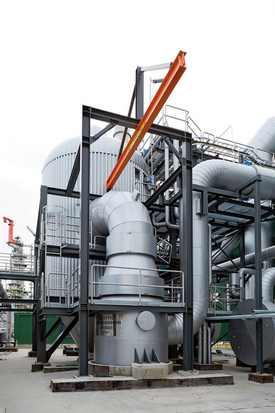 ANDRITZ has delivered several ARC systems for the removal of chlorides and potassium from the kraft chemical recovery cycle. © ANDRITZ Evaporation plant with a high-concentration section for a total evaporation capacity of 1,100 t/h and a final dry solids content of 85%. The evaporation plant delivery includes key equipment and technology with ANDRITZ multiple-effect lamella evaporators. The design of the evaporators and process reflects the latest and most modern ANDRITZ evaporator technology and delivers excellent environmental and economic performance.
ANDRITZ has delivered several ARC systems for the removal of chlorides and potassium from the kraft chemical recovery cycle. © ANDRITZ Evaporation plant with a high-concentration section for a total evaporation capacity of 1,100 t/h and a final dry solids content of 85%. The evaporation plant delivery includes key equipment and technology with ANDRITZ multiple-effect lamella evaporators. The design of the evaporators and process reflects the latest and most modern ANDRITZ evaporator technology and delivers excellent environmental and economic performance.
- Ash re-crystallization (ARC) system, with an ash handling capacity of 400 t/d, to treat the ash from the electrostatic precipitator by decreasing the chloride and potassium content while recovering sodium and sulfate. The ANDRITZ ARC process is based on evaporative crystallization by using economical mechanical vapor recompression (MVR) technology as the heat source.
This order once again confirms the excellent business relationship between ANDRITZ and Sun Paper.
In July 2019, Sun Paper established a wholly owned subsidiary – Guangxi Sun Paper – to build an integrated pulp and paper mill in Beihai. The new greenfield mill in Beihai will eventually have a total pulp and paper capacity of 3.5 million tons annually. The mill will be constructed in two phases over approximately five years.
BREAKING NEWS!! - ZELLCHEMING-Expo 2021: Date and new venue are fixed!
The ZELLCHEMING Association is pleased to announce the return to a proven and popular location, the RheinMain CongressCenter (RMCC) Wiesbaden, at the same time as the date for the Expo and the Annual General Meeting that will take 9 to 10 June 2021. The event planned for June 2020 in the Frankfurt exhibition halls had been cancelled because of the corona pandemic.
The ZELLCHEMING association is thus continuing its successful events in the past: From 2003 to 2013, the Expo and General Meeting in the Rhein-Main-Hallen had already been organized by the association itself. In 2014, the association moved to Frankfurt am Main, as the long-standing location was torn down and rebuilt. In this context, a close cooperation with the organizer Mesago Messe Frankfurt started.
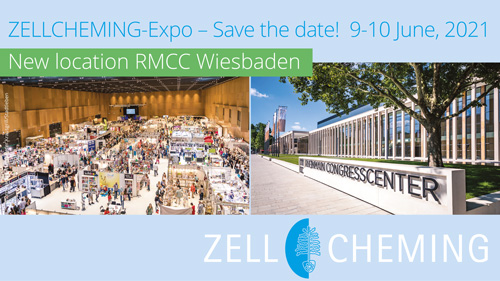
From the beginning of July, ZELLCHEMING will again take over the management of the event. This includes the areas of organization, visitor support as well as communication and marketing. At the same time, the good cooperation with Mesago will continue: The trade fair company will remain responsible for exhibitor acquisition and services.
Petra Hanke, Managing Director of the ZELLCHEMING Association, explains: "From our point of view, we have come full circle here: Although the RMCC was rebuilt exactly at the old location, it is a highly modern and absolutely up-to-date congress Center. The ZELLCHEMING Association has also set itself the goal of working on current technical challenges facing the paper and pulp industry, while at the same time cultivating our roots and the tradition resulting from our more than 115-year history!
„We are using the break caused by the Corona pandemic this year for the reorientation of our concept, and against this background it makes sense that we will again have a direct influence on the content of the trade fair. But we also see it as a very positive signal that we can continue our partnership with Mesago“, she goes on.
"We look forward to being part of the ZELLCHEMING family in the future and to accompanying the traditionally rich paper industry with new and innovative topics to their new exhibition location. With our long-established network and our many years of expertise as a trade fair organizer, it is an honor for us to continue supporting the Expo." said Sabrina Zapf, Deputy Vice President of Mesago GmbH, responsible for the ZELLCHEMING-Expo.
For further information please contact Mrs. Petra Hanke, Phone +49 (0) 6150/5 44 84 04, This email address is being protected from spambots. You need JavaScript enabled to view it.
